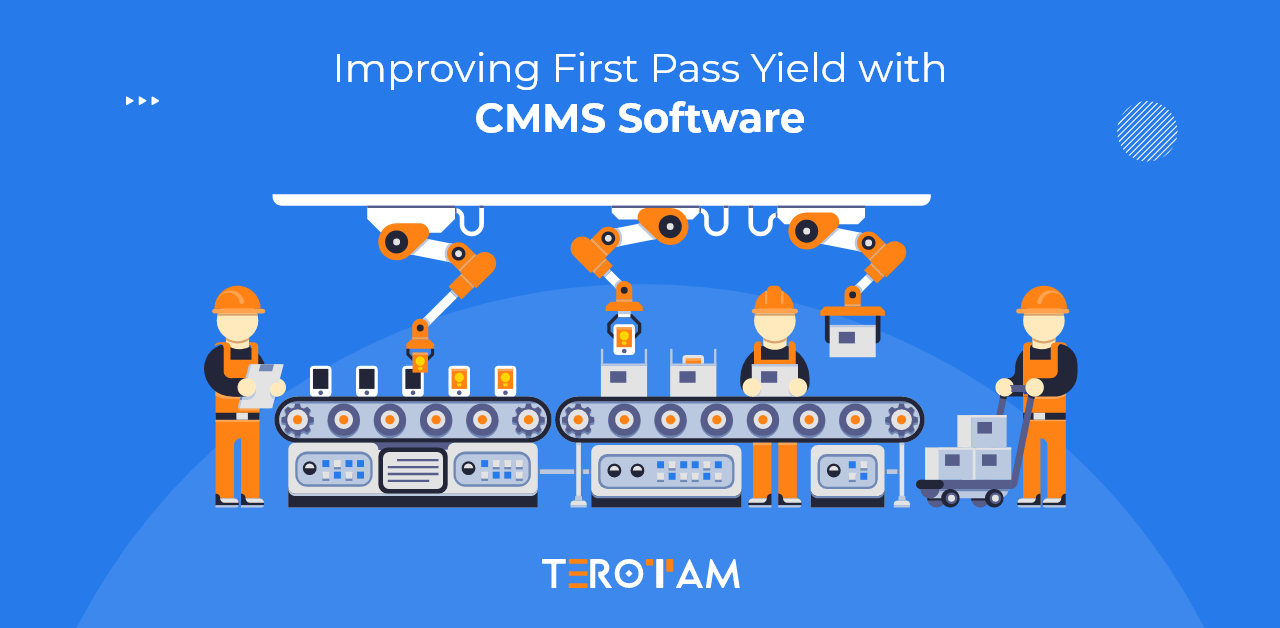Nowadays in manufacturing, the ability to produce high-quality products consistently is paramount. One of the most effective ways to measure and enhance product quality is through First Pass Yield (FPY)—a metric that tracks the percentage of products produced correctly on the first attempt, without the need for rework or adjustments.
In this article, we will explore the relationship between CMMS software and FPY in the manufacturing industry, highlighting how CMMS solutions can optimize maintenance efforts and boost production efficiency to achieve higher first-pass yields.
What is First Pass Yield (FPY) in Manufacturing?
First Pass Yield (FPY) is a critical performance metric in manufacturing that measures the percentage of products that are produced correctly the first time, without requiring any rework, repairs, or adjustments.
FPY helps manufacturers evaluate the efficiency and quality of their production processes, providing insight into the effectiveness of their systems, equipment, and workforce. It’s a fundamental metric for assessing the overall performance of a manufacturing operation and is directly linked to product quality, production efficiency, and cost-effectiveness.
The Formula for FPY
FPY is calculated by dividing the number of good units produced by the total number of units produced before any defects or rework are identified. The formula is as follows:
FPY= (Good Units Produced / Total Units Produced) ×100
For example, if a production line produces 1,000 units, and 950 of those units pass the quality check without needing rework, the FPY would be:
FPY= (9501000) ×100 = 95%
A higher FPY indicates a more efficient and effective production process, as fewer resources are required for rework and fewer defects are present in the final product.
The Significance of FPY in Manufacturing
FPY is a key indicator of a manufacturing operation’s ability to produce high-quality products with minimal waste. High FPY reflects an efficient production process that reduces scrap, rework, and delays, leading to significant cost savings. Conversely, low FPY typically signals issues in the manufacturing process that could require investigation and corrective action.
Some key aspects of FPY’s significance in manufacturing include:
Quality Control:
FPY is directly related to product quality. High FPY indicates that most products meet quality standards on the first attempt, while low FPY suggests that the manufacturing process may be producing defects.
Cost Efficiency:
High FPY minimizes the need for rework, which in turn reduces labor, materials, and time costs associated with fixing defective products. Low FPY can lead to increased costs for scrap, labor, and equipment use during rework.
Customer Satisfaction:
Products that pass quality checks on the first attempt are more likely to meet customer expectations, leading to higher customer satisfaction and retention. A high FPY ensures timely delivery of high-quality products to customers.
Production Efficiency:
High FPY ensures that resources (e.g., raw materials, labor, machine time) are being used efficiently. When fewer products need rework, production flow is smoother, leading to faster turnaround times and optimized resource allocation.
What are the Factors That Affect FPY in Manufacturing?
A variety of factors impact FPY in a manufacturing environment. Some of the most common ones include:
Equipment Reliability:
Frequent equipment breakdowns or underperforming machinery can lead to defects in the product and require rework. Equipment performance directly impacts FPY, as unreliable machines produce more defective units, reducing the overall yield.
Operator Skill and Training:
Skilled and well-trained operators are less likely to make mistakes during the manufacturing process. Poorly trained operators may create defects, leading to rework and lower FPY.
Process Consistency:
Variations in the manufacturing process, such as inconsistent raw material quality, fluctuating machine speeds, or inadequate calibration, can affect product quality and lead to lower FPY. Standardized and controlled processes help maintain high FPY.
Quality Control Measures:
Inadequate or inconsistent quality control measures can allow defective products to pass undetected during initial inspections. Implementing robust quality control standards throughout the production process helps ensure that only defect-free products move forward, increasing FPY.
Supply Chain Issues:
Variability in the quality of raw materials or parts sourced from suppliers can lead to defects in the final product. High-quality materials, consistently sourced, help ensure better FPY.
Why High FPY is Crucial for Manufacturers?
Achieving a high First Pass Yield (FPY) is essential for maintaining operational efficiency and high product quality in manufacturing. When FPY is high, fewer products need rework or repairs, which streamlines production, reduces costs, and ensures quicker delivery times. A focus on improving FPY enables manufacturers to optimize processes, reduce waste, and enhance resource utilization. This not only boosts production output but also improves customer satisfaction by delivering high-quality products on time.
- Reduces material waste by minimizing defective products that need to be scrapped.
- Lowers labor costs associated with rework, repairs, and additional quality control measures.
- Enhances equipment efficiency by reducing downtime and wear on machines caused by defects.
- Increases throughput by eliminating delays in production related to rework and quality checks.
- Strengthens customer satisfaction by consistently delivering high-quality products with fewer defects.
- Supports lean manufacturing principles by reducing waste and optimizing resource allocation.
How does CMMS Software Help Improve FPY?
CMMS software is essential for improving First Pass Yield (FPY) as it ensures equipment stays in optimal condition, preventing unexpected breakdowns that could disrupt production. Preventive maintenance schedules, automatically generated by CMMS, reduce the chances of malfunctions that lead to defective products. Keeping machines running efficiently minimizes downtime and ensures a more reliable production flow, directly impacting the quality of products produced on the first pass.
CMMS also provides manufacturers with valuable insights into equipment performance. Real-time monitoring and analytics identify potential issues early, allowing for adjustments to maintenance practices. These proactive measures help to optimize equipment use, reduce defects, and improve FPY, ensuring more products meet quality standards from the start and boosting overall production efficiency.
To cut the long story short..!!
When FPY improves, everything falls into place—better products, fewer delays, and smoother operations. CMMS software can help make that happen, ensuring your equipment is always running at its best and reducing those costly mistakes. Ready to see how it works for you? Reach out to us at contact@terotam.com – we’re excited to help you unlock your manufacturing potential!










